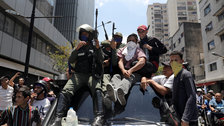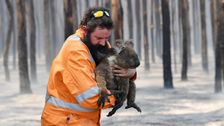
Venezuelan opposition leader Juan Guaidó launched his most drastic attempt yet to oust President Nicolás Maduro on Tuesday morning, when he appeared in front of armed forces and called for an uprising against the government. Guaido proclaimed the and called on his backers to flood the streets to demonstrate, sparking a day of heated demonstrations and clashes with pro-Maduro forces that included an armored vehicle driving into protesters.
“The national armed forces have taken the correct decision, and they are counting on the support of the Venezuelan people,” Guaidó said in a video, posted on Twitter, in which he was flanked by members of the armed forces.
Guaidó, the leader of the Venezuelan national assembly, has waged a continuous fight to topple Maduro that has intensified since Jan. 23, when Guaidó declared himself Venezuela’s legitimate leader and called on Maduro to step aside.
Through it all, Guaidó has enjoyed the support of the United States and President Donald Trump, who Guaidó’s claims of legitimacy and placed a series of sanctions on government officials and Venezuela’s state-owned oil company in an effort to loosen Maduro’s grip on power.
On Tuesday, U.S. National Security Adviser John Bolton backed Guaidó’s calls for an uprising, tweeting to Venezuelan National Defense Minister Vladimir Padrino that the nation’s armed forces should “protect the Constitution and the Venezuelan people” against “the usurpation of democracy.”
As Venezuela once again erupts in protests that could continue to intensify on Wednesday, when mass demonstrations were already scheduled, here’s a look at how Venezuela’s political crisis reached this point.

Who is Juan Guaidó?
Guaidó has served in Venezuela’s national assembly since 2016 as a member of the centrist Voluntad Popular party, which he helped launch a decade ago in order to oppose the government led by former socialist President Hugo Chávez. But he was little-known outside Venezuela before January, when he assumed the top post in the assembly and quickly began moving to put an end to Maduro’s reign.
Guaidó was briefly detained by Venezuela’s intelligence authorities in January ― 10 days later, he declared himself Venezuela’s legitimate leader and called for new elections, an effort he said was vital to the restoration of democracy in the crisis-stricken South American nation.
Maduro’s government said it had not ordered the arrest of Guaidó, who is allied with Leopoldo Lopez, a longtime opposition leader who was arrested in 2014 after a series of anti-government protests. Human rights groups have called Lopez’s arrest politically motivated and called for his release.
Though more than 50 countries backed Guaidó’s claim to legitimacy, many of them (as well as Mexico and Uruguay, which remain neutral) have said they prefer renewed dialogue between Maduro’s government and Guaidó’s opposition movement.
Guaidó, however, has largely rejected those overtures and similar offers from the European Union, Russia and the Vatican. The United States, through Bolton, has echoed those rejections.

How did we get here?
The United States has had a tense relationship with Venezuela’s government since Chávez, a socialist, won his first election in 1999. The George W. Bush administration was linked against Chávez in 2002 ― Elliott Abrams, a Bush adviser who is now Trump’s special representative on Venezuela, reportedly , though he and the Bush administration denied any links to the effort to oust Chávez.
Maduro assumed the presidency after Chávez’s death in 2013, and has earned even more ire from the American government, especially as the country has plunged into economic and humanitarian crises during his time in office.
Maduro has ruled with an increasingly authoritarian bent, cracking down on political dissent as opposition has increased amid the crises, which resulted in part from collapsing global oil prices that hammered the Venezuelan economy. International organizations and local reports have accused Maduro of rampant human rights abuses, including to silence critics and opponents. Maduro’s forces have carried out a “” that has only intensified, according to Amnesty International, which has criticized the current regime for extrajudicial killings, crackdowns on free speech and violent political intimidation campaigns.
The political instability and humanitarian disaster in Venezuela has resulted in and migrants fleeing the country, with most going to neighboring countries in the region. Opposition rallies in recent years have brought hundreds of thousands of people into the streets, and resulted in violent crackdowns by security forces.

In May 2018, Maduro won a second term as president in elections that were by his opponents inside the country. Foreign governments and election monitors, including the United States, the European Union and the United Nations, all additionally pointed to irregularities throughout the electoral process.
The Trump administration expanded sanctions that had by President Barack Obama, and has continued to intensify its economic pressure on Maduro’s government since Guaidó declared himself the country’s interim president ― a move that came amid mass protests that grew in strength and frequency immediately afterward. (Some progressive Democrats and many foreign observers have , saying that they will only exacerbate the suffering of Venezuela’s people.)
In March, the political crisis nearly exploded on Venezuela’s border with Colombia, after trucks carrying humanitarian aid sponsored by the U.S. and Guaidó caught on fire after protesters clashed with Venezuelan security forces. The fires led to fervent calls from U.S. officials and lawmakers ― especially Florida Sen. Marco Rubio (R) ― for even tougher actions against Maduro, but videos showed the blazes likely . The United Nations and the International Red Cross had already criticized the United States for , especially as U.S. government officials throughout the mission.
Maduro has clung to power throughout it all, with help from Russia, India and other nations that have continued purchasing Venezuela oil. He also has the backing of the leaders of Venezuela’s military in spite of Guaidó’s efforts to flip them to his side.

Why does the U.S. want Maduro out?
The Americans’ stated cause against Maduro is its desire to address the humanitarian crisis, remove a dictatorial leader and restore democracy in one of the Western Hemisphere’s most influential nations.
But Trump, Rubio and other Venezuela hawks driving the U.S. response have hardly concealed the domestic political concerns behind their aggressive approach over the last three months.
Over 190,000 Venezuelans live in Florida, a key state for the 2020 presidential elections, with a large number holding after having left the country during its slide into authoritarianism and economic crisis in recent decades.
Rubio and other Florida Republicans have taken on leading roles in calling for Maduro’s ouster, while Trump, Secretary of State Mike Pompeo and National Security Advisor Bolton have thrown the White House’s backing behind a hardline Venezuela policy. In February, three weeks after he recognized Guaidó, Trump , where he railed for nearly an hour against Venezuela’s “socialist tyranny” and attempted to tie the Democratic Party to socialism ahead of the 2020 presidential elections. (“America will never be a socialist country,” he insisted.) Trump has also shown little concern for human rights and an affinity for strongmen and dictators throughout his presidency, suggesting that humanitarian concerns are not the sole driving factor behind his focus on Venezuela.
Bolton, who throughout his career has shown a bottomless appetite for intervention, listed Venezuela along with leftist authoritarian governments Nicaragua and Cuba as what he called a “troika of tyranny” during a speech in April that echoed George W. Bush’s “axis of evil” address which preceded the 2003 Iraq war. Bolton has also framed a change in Venezuela’s government as a , given that Venezuela has the world’s largest proven oil reserves. Though many Venezuelans in the U.S. have backed the Trump administration’s efforts, some experts have warned that its “” may have only bolstered Maduro.
And although it’s unclear whether the U.S. had advance knowledge of Guaidó’s uprising, flipping the Venezuelan military has been a central tenet of the U.S. and Guaidó’s strategy against Maduro since January. And whatever role the United States may or may not be playing in Tuesday’s developments, it seems clear that Guaidó has once again chosen to pursue the more aggressive anti-Maduro actions preferred by Bolton and the U.S. government instead of the relatively measured approach favored by many of the other countries that have recognized the opposition leader as Venezuela’s rightful president.

Who else is backing Guaidó?
A number of countries in Latin America and the European Union have recognized Guaidó as the legitimate interim president and called on Maduro to hold free and fair elections. The Lima Group, a 14-nation organization of Latin American states and Canada, has also called for a vote to ensure a peaceful and imposed sanctions against the Maduro government.
But none of these countries have taken as aggressive a stance in backing Guaidó as the U.S., which has floated the prospect of and openly called on Venezuela’s military to turn against Maduro. Even U.S. allies in the region, such as far-right Brazilian President Jair Bolsonaro, have at committing to sending in troops or offering direct military support, though Bolsonaro also joined Trump in refusing to take military options off the table during a March White House visit.
How did they respond?
While the U.S. backed Guaidó’s Tuesday morning calls for a coup, other governments involved in the Venezuelan crisis took softer stances.
Mexico, which hasn’t officially recognized Guaidó, called for continued dialogue between Maduro’s government and Guaidó’s movement, saying it if mass protests occurred as a result of Guaidó’s declaration. Spain, which has recognized Guaidó, announced , saying that a democratic transition “has to come hand in hand with elections.”
Meanwhile, Maduro has the international support of countries including China, Turkey and Russia. The Kremlin has 100 troops to Venezuela, ostensibly to service the country’s S-300 air defense missile systems which it purchased from Russia, and there are that the Russian-backed Wagner mercenary group is also operating in the country.
Russia’s foreign ministry on Tuesday accused Guaidó and the opposition of with Maduro’s forces, Reuters reported.
What happens now?
Guaidó’s calls led to protests across Venezuela, according to news reports, but it remains unclear whether they will give him enough momentum to bring down Maduro, particularly with the military that he and the U.S. see as vital to the effort.
The Maduro government insisted Tuesday morning that it still had the broad support of the Venezuelan armed forces, and rallied supporters , the nation’s capital. National Defense Minister Vladimir Padrino reiterated that support and said that Guiado’s opposition efforts had been “defeated,” though cameras also showed Guaido walking through the streets with the apparent backing of .
Bolton, the U.S. national security adviser, told reporters outside the White House that three senior Venezuelan officials ― including Padrino and Supreme Court chief justice Maikel Moreno — had pledged to back the uprising, but none appeared to follow through on Tuesday, leading Bolton to tweet a threat at the three officials:
There were reports that some of the clashes had turned violent, and others that they were about whether the military was supporting or opposing Maduro. The Maduro government as demonstrations carried on throughout the day. Video from one protest showed a Venezuelan military vehicle running over a crowd of demonstrators.
A former U.S. official speculated to Reuters that Guaidó’s Tuesday call was likely meant to on Wednesday, in the hopes of making them an inflection point in the fight to oust Maduro. Whether protests escalate and what role the military decides to play will be the focus of international attention as the unrest continues, as will how deeply the U.S. decides to involve itself in the crisis.
But on Tuesday afternoon, Leopoldo Lopez, one of Guaidó’s chief allies who had escaped house arrest to appear at the demonstrations, abandoned the protests to seek asylum protections at the Chilean ambassador’s residence in Caracas, Chile’s foreign minister . Brazil also announced that 25 members of the Venezuelan military had at its embassy in Caracas.
With Maduro proclaiming that he had “” from the military, the asylum requests from Lopez and military members who apparently supported the opposition were seen that Guaidó’s uprising it needs to oust the president.
This has been updated with additional information about the uprising.



